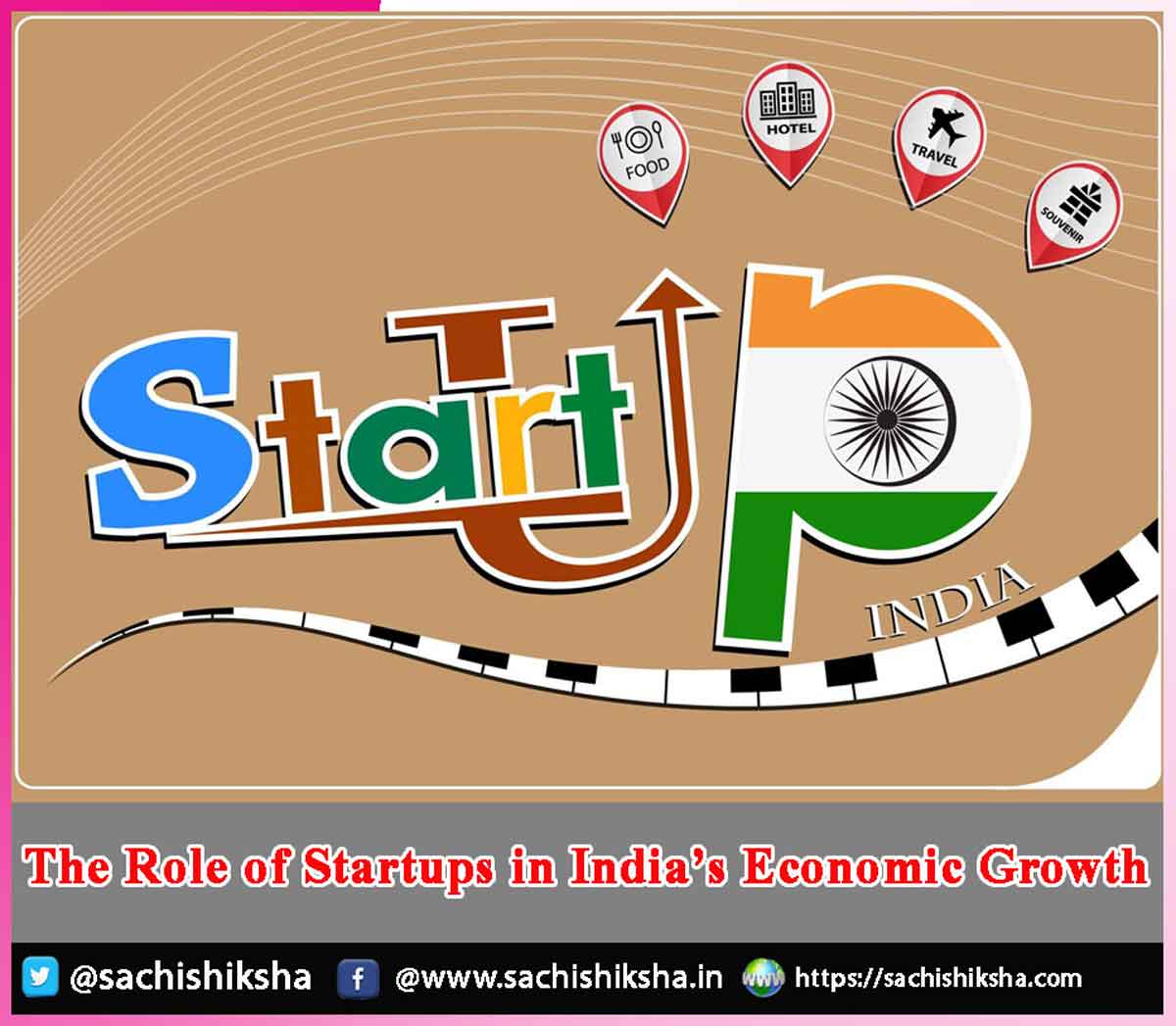The Role of Startups in India’s Economic Growth
Introduction: In the last two decades, India has seen a significant transformation in its economic landscape, largely driven by the emergence of startups. A thriving startup ecosystem has become a cornerstone of India’s growth story, contributing immensely to job creation, innovation, and global competitiveness.
Table of Contents
Understanding the Startup Ecosystem in India

Startups as Engines of Economic Growth
Contribution to GDP:
Startups contribute significantly to the nation’s economic development. This contribution is expected to grow as more startups emerge in new-age industries like artificial intelligence, block chain, electric mobility, and renewable energy.
Startups are instrumental in creating new market segments, introducing novel business models, and enhancing productivity across industries. By embracing digitalization, startups have helped existing sectors optimize operations, reduce costs, and offer improved services, thus stimulating economic growth.
Job Creation:
One of the most important ways in which startups contribute to the Indian economy is through job creation. The startup sector is one of the fastest-growing sources of employment in India. Startups, particularly in technology-driven sectors, tend to offer high-paying, skilled employment, attracting a young, dynamic workforce. This is crucial for India, which has a demographic dividend with a significant proportion of its population under 35 years of age. Moreover, the startup ecosystem has a positive ripple effect on other sectors such as logistics, retail, and hospitality, further driving job creation.
Rural and Regional Development
While metropolitan cities like Bengaluru, Delhi, and Mumbai remain startup hubs, there has been a marked rise in startups emerging from smaller cities and rural areas in India. The advent of digital infrastructure, coupled with affordable internet access, has enabled entrepreneurs in Tier-2 and Tier-3 cities to launch and scale their businesses.
Startups focused on agricultural technology (agritech), rural innovation, and social entrepreneurship have created employment opportunities and improved the livelihoods of millions in rural areas. For example, companies like Agro Star and Ninjacart have leveraged technology to provide farmers with better access to inputs, market linkages, and financial services.
Technological Innovation and Advancements
Startups have become a hotbed of innovation in India, with a large number of them working in emerging technologies like artificial intelligence (AI), machine learning (ML), the Internet of Things (IoT), block chain, and renewable energy. These innovations have not only revolutionized industries but also played a role in positioning India as a global player in technology.
Fostering a Culture of Innovation
In India, tech startups are developing innovative solutions that address local challenges. For example, Flipkart, an Indian e-commerce giant, revolutionized online shopping in India and contributed to the digitalization of the retail sector. India’s growing pool of tech-savvy entrepreneurs is fostering a culture of innovation, where new ideas are quickly tested, validated, and scaled. This has helped in the development of cost-effective solutions tailored to the needs of the Indian market.
Contributing to Global Competitiveness
As India continues to evolve into a digital economy, the innovations born from startups are making an impact globally. Indian startups like Zomato, Paytm, Byju’s, and Fresh works have expanded their reach beyond national borders, competing with global giants and establishing India as a key player in the tech world.
Startups are also driving innovation in sectors that have the potential to transform the global economy. India is becoming a leader in areas such as electric mobility, fintech, and space technology, thanks to the growing number of Indian startups developing cutting-edge technologies.
Startups and Social Impact
Startups in India are not just focused on profits; many of them have a strong social mission and aim to create positive change in society. Social entrepreneurship in India is on the rise, with startups addressing pressing issues like poverty, education, healthcare, and environmental sustainability.
Environmental Sustainability:
Environmental sustainability is another area where startups are playing a critical role. In a country that faces severe environmental challenges, from pollution to water scarcity, startups are offering innovative solutions to mitigate these issues. Banyan Nation, a Hyderabad-based startup, uses technology to recycle plastic waste, while SustainEarth focuses on promoting sustainable agriculture.
Startups are also focusing on renewable energy solutions, such as solar and wind power, and electric vehicles (EVs), contributing to India’s goal of reducing carbon emissions and achieving energy security.
Investment and Funding Landscape
The startup ecosystem in India has witnessed a significant surge in venture capital (VC) and private equity (PE) funding. As of 2023, Indian startups attracted over $25 billion in funding, a sign of investor confidence in the country’s entrepreneurial potential. Global investors, including SoftBank, Sequoia Capital, Tiger Global, and Accel, have actively invested in Indian startups, helping them scale and compete globally.
Additionally, the rise of angel investors, crowd funding platforms, and government-backed funds have created diverse funding sources for startups. With access to capital, startups are able to innovate, expand, and create jobs at an accelerated pace.
Challenges Faced by Startups in India
Despite the positive contributions of startups to India’s economy, the sector faces several challenges that need to be addressed for sustainable growth. These challenges include:
Regulatory Hurdles:
India’s regulatory environment can be complex and cumbersome for startups, with challenges related to obtaining licenses, permits, and navigating multiple layers of bureaucracy. Streamlining the regulatory process and reducing the compliance burden would go a long way in fostering entrepreneurial activity.
Access to Funding:
Although there is increasing access to capital, funding remains a challenge for early-stage startups, particularly in non-tech sectors. There is a need for more targeted funding options for startups in agriculture, healthcare, and manufacturing, which often require substantial initial investment.
Infrastructure and Skill Gap:
While urban centers in India have seen rapid development in infrastructure, smaller cities still face gaps in critical areas such as transportation, logistics, and digital infrastructure. Additionally, there is a significant skills gap, particularly in fields like AI, machine learning, and data science, which limits the growth potential of tech startups.
The Future of Startups in India
The future of India’s startup ecosystem looks promising. With an increasing number of young entrepreneurs, a growing digital economy, and supportive government policies, startups are expected to continue playing a central role in India’s economic development. The continued investment in education, infrastructure, and research and development will enable India to maintain its competitive edge and become a global hub for innovation.
The rise of IndiaStack, a set of open APIs that have digitized key services like payments, identification, and health records, further paves the way for new startups to emerge. This digital infrastructure allows startups to scale quickly and operate across the country, contributing to India’s economic growth.
Conclusion
Startups are revolutionizing the economic landscape of India. From job creation and technological innovation to addressing social challenges and fostering global competitiveness, the startup ecosystem has become a powerful engine driving economic development. While challenges persist, the future looks bright, as India continues to support and nurture its entrepreneurs. As startups continue to thrive, they will be key drivers in India’s journey towards becoming a $5 trillion economy and a global innovation leader.













































